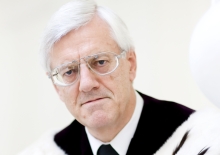Inhalt:
.Welcome!
 Let me welcome you most cordially to this website on behalf of the Conference of European Constitutional Courts! It is an honour and a privilege for the Austrian Constitutional Court to currently chair this Conference. During its chairmanship, it will be the Court’s task to prepare the XVIth Congress of the Conference to be held in Vienna from 12–14 May 2014. At the same time, the Austrian Constitutional Court represents the Conference of European Constitutional Courts at international events, especially at the congresses of the other regional and linguistic groups of constitutional courts and at the World Conference on Constitutional Justice.
Let me welcome you most cordially to this website on behalf of the Conference of European Constitutional Courts! It is an honour and a privilege for the Austrian Constitutional Court to currently chair this Conference. During its chairmanship, it will be the Court’s task to prepare the XVIth Congress of the Conference to be held in Vienna from 12–14 May 2014. At the same time, the Austrian Constitutional Court represents the Conference of European Constitutional Courts at international events, especially at the congresses of the other regional and linguistic groups of constitutional courts and at the World Conference on Constitutional Justice.
In the run-up to the XVIth Congress of the Conference of European Constitutional Courts, the Austrian Constitutional Court has invited the presidents of the member courts of the Conference to a “Circle of Presidents” in Vienna from 9–11 September 2012. On the occasion of this preparatory meeting, the participating presidents will decide on the organizational framework for the next Congress. In substantive terms, their main task will be to agree on the theme of the Congress and the subject matters to be dealt with in its theoretical and practical deliberations.
As stated in the preamble to the Statute of the Conference, regular contacts between constitutional courts and the desire to share experience in constitutional practice and jurisprudence within the framework of specialized conferences are at the core of the activities of the Conference, its aim being to enhance the independence of constitutional courts as essential factors in guaranteeing and implementing democracy and the rule of law, in particular with a view to securing the protection of human rights.
By guaranteeing the constitutionality of state action, constitutional justice makes and extremely important and, in fact, indispensable contribution to the preservation of the rule of law, the protection of the individual’s fundamental rights and the strengthening of democracy in our states.
For the presidents and members of constitutional courts, this implies a large measure of responsibility for preserving the rule of law and democracy in our countries – a responsibility we must always be aware of in the exercise of our judicial function.
The year 2012 also invites us to take a look back on the past forty years in the history of the Conference of European Constitutional Courts: In January 1972, the constitutional courts of the Federal Republic of Germany, Italy, Austria and the former Socialist Federal Republic of Yugoslavia met, upon the initiative of the latter, in Dubrovnik for a first “Conference of European Constitutional Courts”. This year marks the 40th anniversary of the Conference. Over the past four decades, the Conference has evolved from a small and select discussion circle into a truly pan-European forum comprising forty full members.
This “landslide victory” of constitutional justice was due, above all, to the political developments in Europe at that time: In the wake of the collapse of the Communist world order and the political transformation in Central, Eastern and South-Eastern Europe, constitutional courts were established in almost all the countries of the former Eastern bloc and the successor states of the Soviet Union. Soon after their foundation, these courts acceded to the Conference.
Moreover, the supreme courts of a number of European states – following the “American model” of constitutional justice – saw the scope of their jurisdiction extended to include constitutional issues. Their participation further enriched the work of the Conference.
Currently, new challenges are arising for scholars and practitioners of constitutional law – and consequently for the Conference of European Constitutional Courts – through the increasing internationalization of constitutional law, interactions with the European Court of Human Rights, as well as the growing trend towards the constitutionalization of European Union law, a matter of enormous significance for more than half of the members of the Conference. In this context, the method of constitutional comparison and the comparison of constitutional jurisprudence are gaining in importance.
Against this background, the Conference of European Constitutional Courts plays a crucial role as a forum for a regular, broad-based and multilateral exchange of opinions, ideas and experience. At the same time, the Conference ideally meets the need for networking among national constitutional courts.
It is a special pleasure for me, as well as the Austrian Constitutional Court, to welcome the presidents of the European constitutional courts and similar institutions in Austria, the country where the idea of constitutional justice first arose.
Prof. Dr. Gerhart Holzinger
President of the Austrian Constitutional Court



